本文介绍数据结构中几种常见的树:二分查找树,2-3树,红黑树,B树
写在前面
- 本文所有图片均截图自coursera上普林斯顿的课程《Algorithms, Part I》中的Slides
- 相关命题的证明可参考《算法(第4版)》
- 源码可在官网下载,也可以在我的github仓库 algorithms-learning下载,已经使用maven构建
- 仓库下载:
git clone git@github.com:brianway/algorithms-learning.git
Binary Search Tree(二分查找树)
定义:A BST is a binary tree in symmetric order.
A binary tree is either:
- Empty.
- Two disjoint binary trees (left and right).
Symmetric order.Each node has a key, and every node’s key is:
- Larger than all keys in its left subtree.
- Smaller than all keys in its right subtree.
在java的实现中,每个节点(Node)由四个域组成:key,value,left,right。即:键,值,左子树,右子树。
1 | private class Node { |
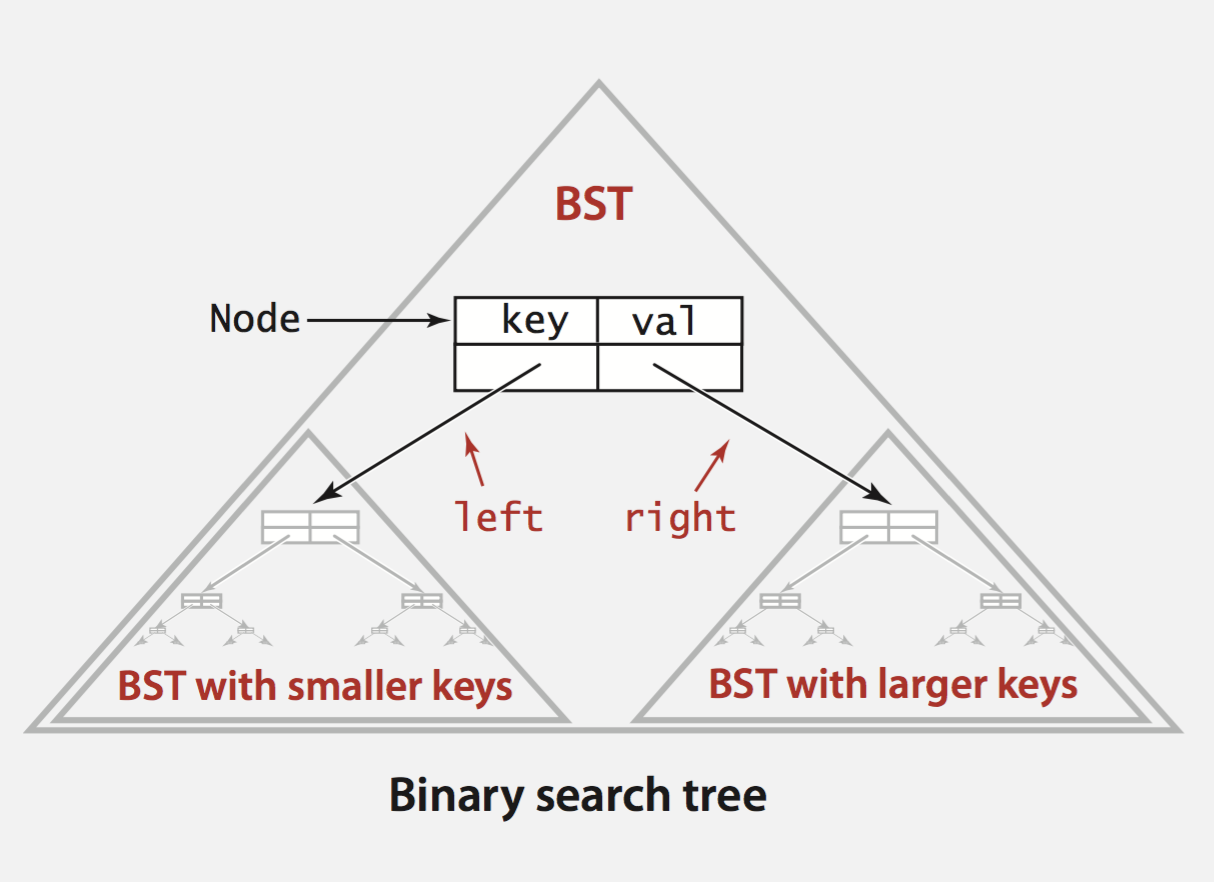
- 查找:得到相应键的值,若无此键则返回null.
1 | /* 查找 */ |
- 插入:如果小,往左;如果大,往右;如果null,插入;如果存在,覆盖。
1 | /* 插入 */ |
比较的次数为节点的深度+1,由于插入节点的顺序会有差异,所以树的高度不确定,最坏的情况是N个节点的树高度为N。
- 删除:列出下面几种处理方法
- 将值置为null,在树中保留键
- 删除最小值:一直向左找到左子树为null的节点,用它的右子节点代替它。
- Hibbard deletion
下面重点讲一下Hibbard deletion,分为三种情况:
- 没有子节点的节点,将其parent link置为null即可。
- 有一个子节点的节点,删除该节点并以子节点代替即可。
- 有两个子节点的节点,找到该节点t的下一个节点x(即右子树的最小节点),在右子树删除这个节点,并将该节点x放到t的位置。
1 | /* 删除 */ |
2-3 Search Trees(2-3树)
在介绍红黑树前,先介绍一下2-3树,便于后面理解红黑树。
2-3树是二分查找树的变形,每个节点是下面两种情况之一:
- 2-node:一个键,两个分叉(smaller,larger)
- 3-node:两个键,三个分叉(smaller,between,larger)
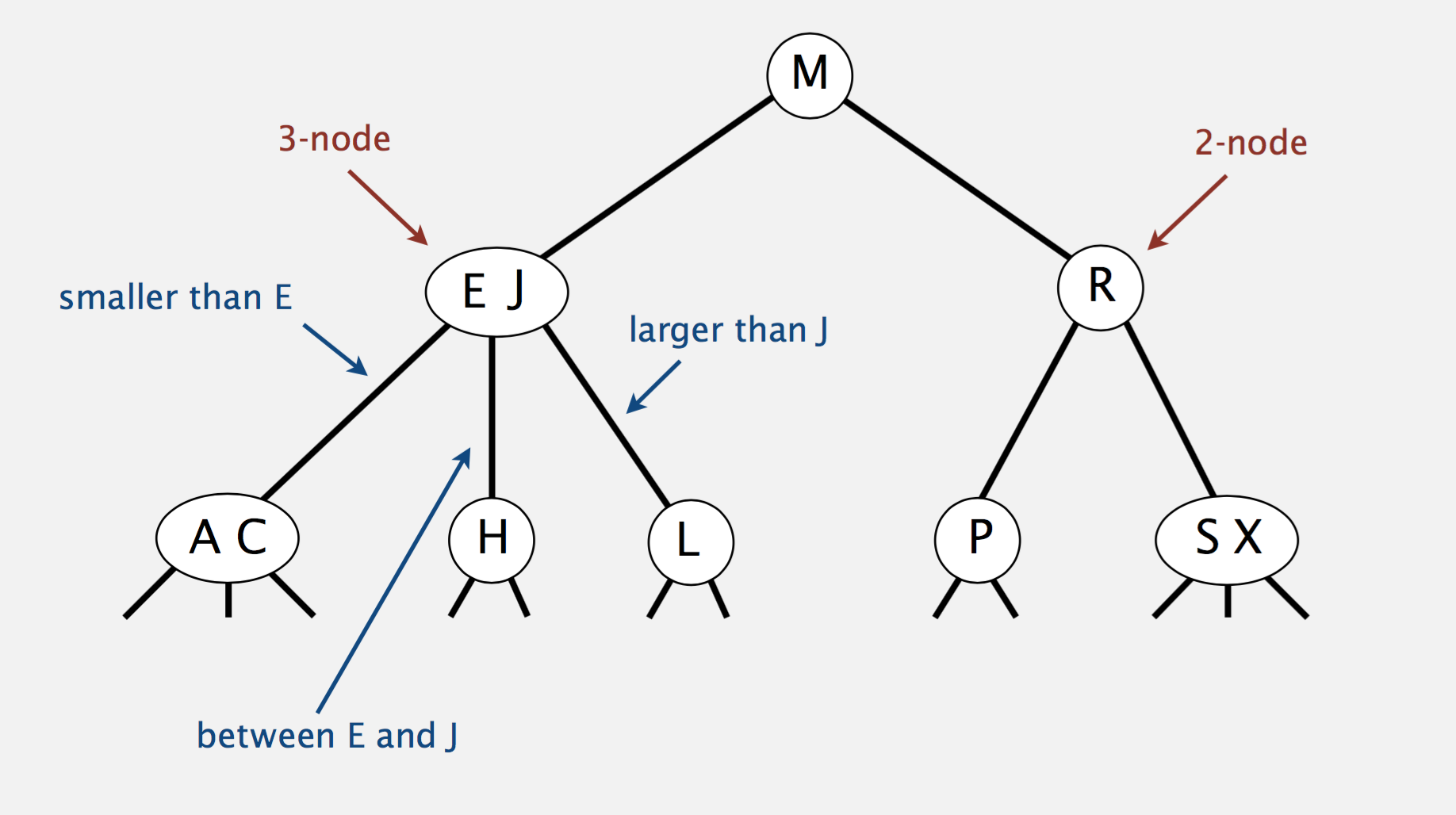
在底部向一个3-node插入。
- 向3-node插入一个键,临时成为一个4-node
- 将4-node中间的key移动到父节点
- 向上重复
- 如果到了顶端的根节点,且根节点是4-node,将其分成3个2-nodes.
总结起来就是:当插入的值导致节点变四叉时进行分裂,将中间的值传给上一个节点,并将另外两个值作为两个子节点分开,若上一节点也因此变成四叉,依次类推。分裂4-node是一个local transformation,只会进行常数次数的操作。高度加一由且仅由顶节点分裂造成
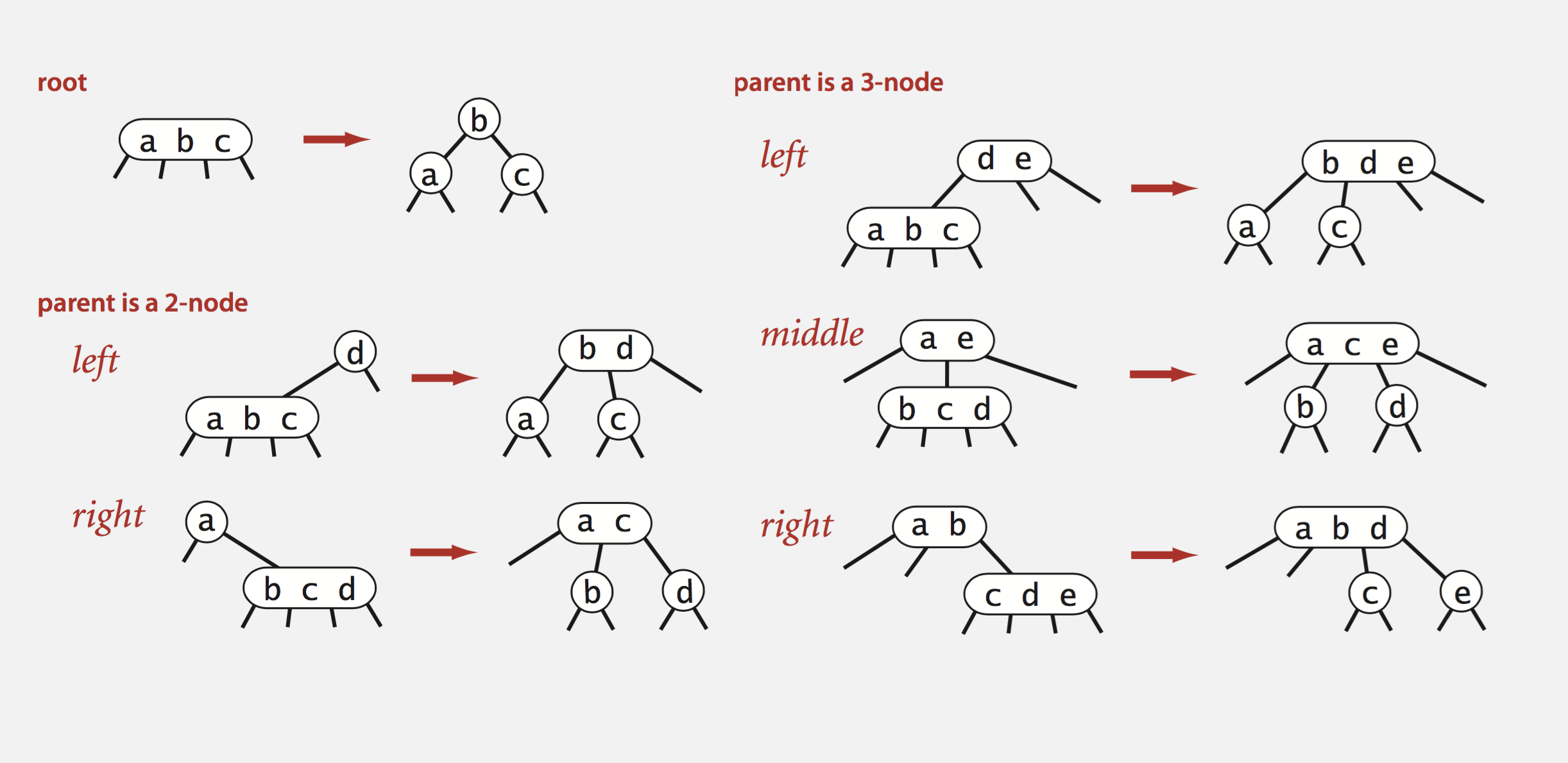
树的高度,在查找和插入时,保证了logarithmic的性能。
- Worst case: lg N. [all 2-nodes]
- Best case: log3 N ≈ 0.631 lg N. [all 3-nodes]
Red-Black BSTs(红黑树)
这里的红黑树均指Left-leaning red-black BSTs。主要是用二叉树的形式来表示2-3树,用一个“内部”的left-leaning连接来表示3-node。red link是2-3tree的三叉节点的连接两个key的内部link,大值作为根节点,小值作为左子节点,故名left leaning 红黑树。

一个等价的定义,A BST such that:
- No node has two red links connected to it.
- Every path from root to null link has the same number of black links.
- Red links lean left.
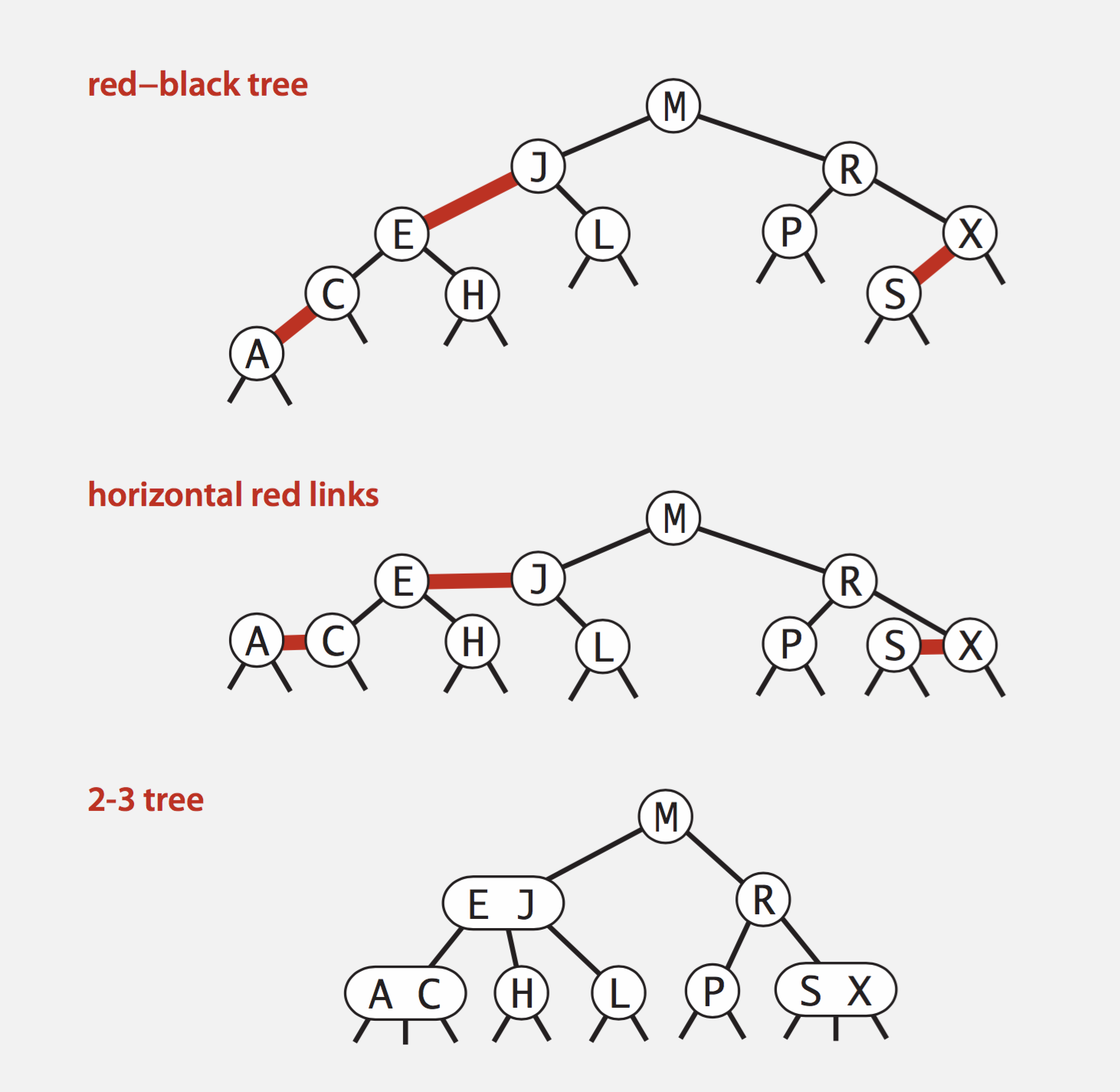
红黑树的java表示
1 | private static final boolean RED = true; |
左转-右转-变色
红黑树插入过程中可能用到的三个基本操作(左转,右转,变色):
- left rotate
- right rotate
- flip colors
下面依次介绍
- 左转

1 | /* left rotate */ |
- 右转

1 | /* right rotate */ |
- 变色

1 | /* flip colors */ |
插入操作
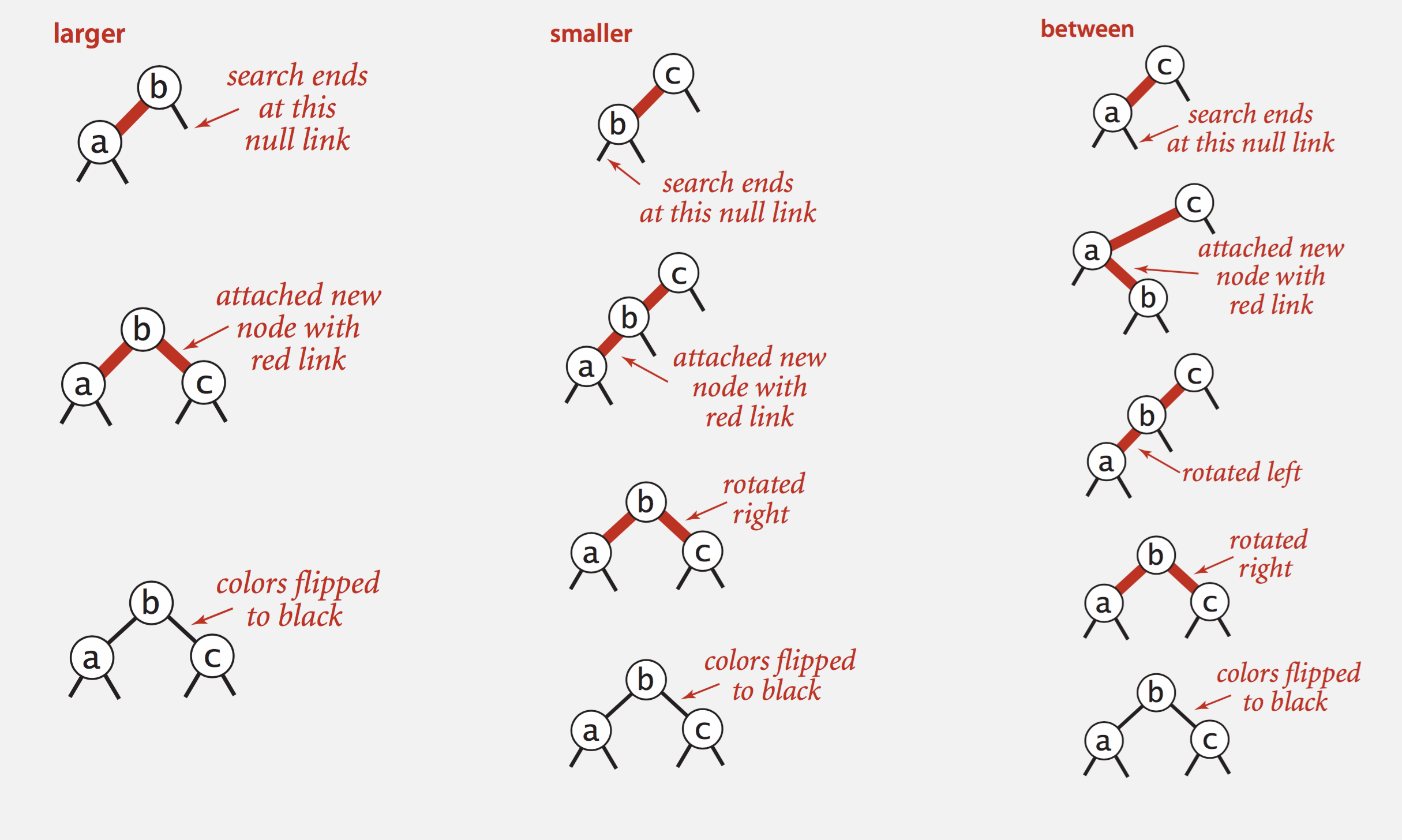
从图中可以看出,插入的次序不同,需要转换的操作也不同,分三种情况(图中每一列是一种情况):
- 已有a和b时,c插入在b的右子节点,直接变色即可
- 已有b和c时,a插入在b的左子节点,先右转把b滑上去,成1中的状态,再变色即可
- 已有a和c时,b插入在a的右子节点,先左转把a滑下去,成2中的状态,再右转+变色即可
从上面的分析可以看出,三种情况之间有转换关系,且逐步趋向简单,如下图所示:
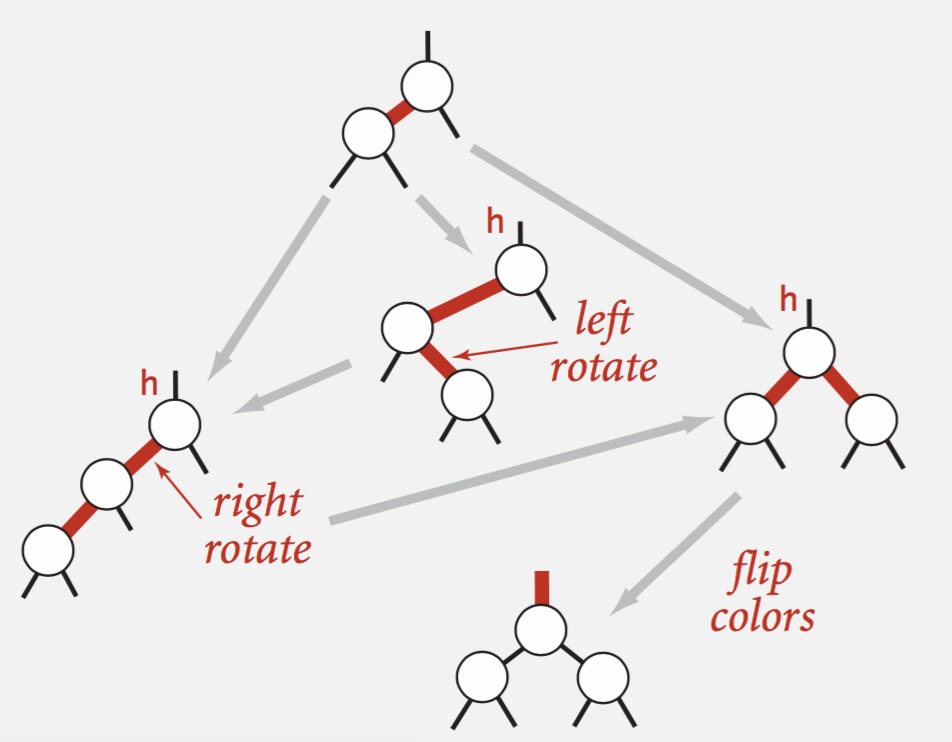
根本原因在于,2-3树中,是把3-node中处于中间的那个键传递给父节点,所以在红黑树中,当有一个节点连了两个 red link时,说明这三个点是一个3-node,但次序还需要调整,从而达到中间键在最上的状态,进而变色。而这个这个调整的趋势则是先让b处于a,c中间(即a的父,c的左子,成一条线),再让b成为a,c的父节点,最后变色。记住这个顺序和原因,写代码就简单了,状态3->状态2->状态1
1 | private Node put(Node h, Key key, Value val) { |
红黑树的高度 h <= 2 lg N,证明:
- Every path from root to null link has same number of black links.
- Never two red links in-a-row.
B-Trees(B树)
最后简单提一下B树,就是将2-3树一般化,将每个节点的key-link pairs增加到 M - 1
- At least 2 key-link pairs at root.
- At least M / 2 key-link pairs in other nodes.
- External nodes contain client keys.
- Internal nodes contain copies of keys to guide search.
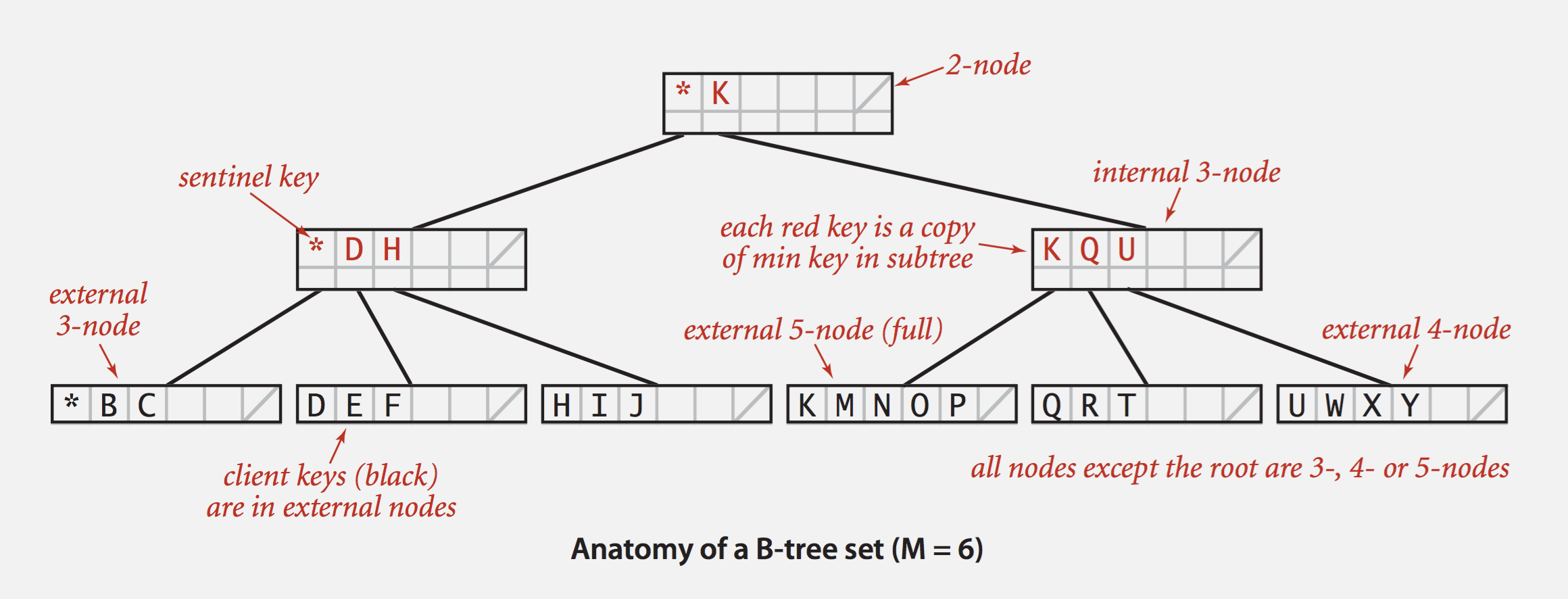
在B树中查找
- Start at root.
- Find interval for search key and take corresponding link.
- Search terminates in external node.
在B树中插入
- Search for new key.
- Insert at bottom.
- Split nodes with M key-link pairs on the way up the tree.
命题:A search or an insertion in a B-tree of order M with N keys requires between log M-1 N and log M/2 N probes
